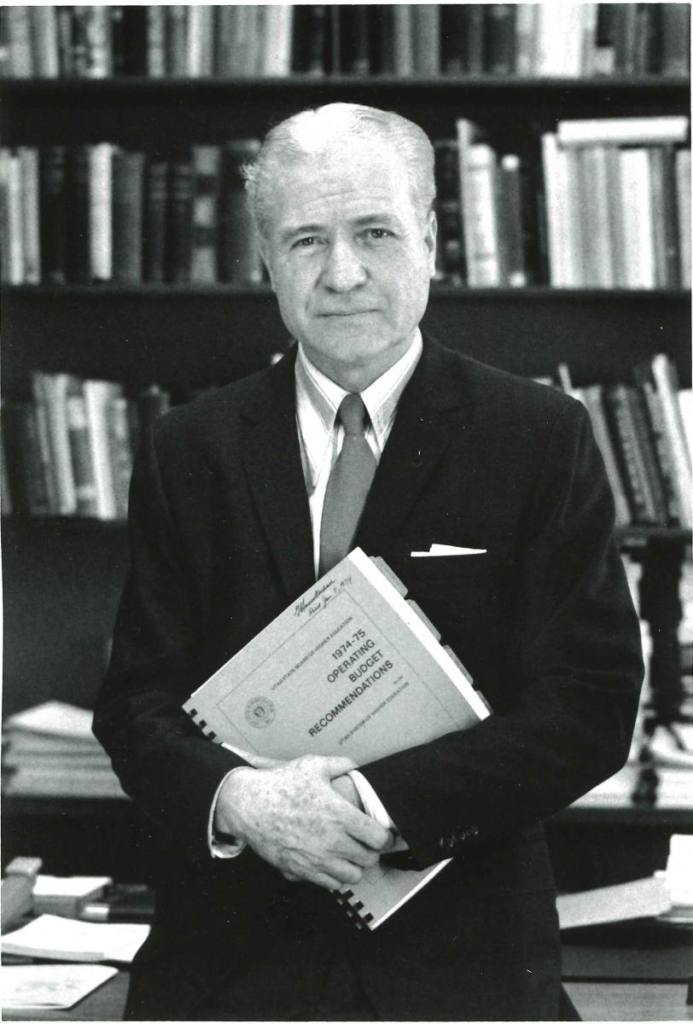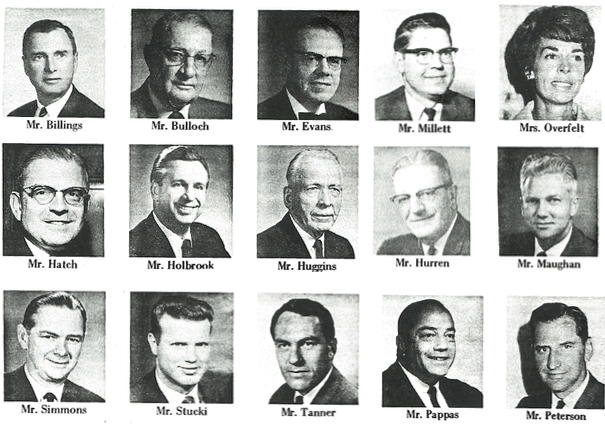[Pictured above: 1969 Utah Board of Regents]
Fifty years ago, the Utah System of Higher Education (USHE) was formed by the state legislature with a single board—the Utah State Board of Regents—to govern the new system.
In 1969, the population in Utah was just over one million. The world was learning new things about the universe and each other. The United States landed on the Moon, hundreds of thousands gathered at a quaint show called Woodstock and Richard Nixon became the 37th U.S. president.
A significant milestone, probably lesser known that year, was that of the creation of the Utah System of Higher Education (USHE) through the Utah Higher Education Act of 1969. In a culmination of more than 70 years’ worth of study, talk and controversy, a new era of higher education governance was ushered in to improve the welfare and education of Utah citizens.
Though created in 1969, the Utah Board of Regents has roots dating to February 28, 1850. On that day, a Board of Regents was established for the University of the State of Deseret, with the power to ‘establish branches…throughout the state.’ This action of the General Assembly was later confirmed by the Territorial Legislature of Utah. Public sponsored higher education thus began in Utah with 25 students enrolled in the single institution.
In the 1969-70 academic year, the total fall enrollment was just over 40,000 students. Utah’s nine institutions consisted of two universities, two newly expanded four-year colleges, three junior colleges, and two technical colleges.
USHE has since seen the enrollment of Utah’s public colleges and universities grow to nearly 190,000 students during the 2019-20 academic year. Today, USHE’s eight institutions consist of six universities and two community colleges, with the public technical colleges being governed separately as the Utah System of Technical Colleges. The most recent addition to the university distinction was Dixie State University in 2013.
Peter W. Billings, the first Board of Regents Chair, saw learning to work together as a significant aspect of 1969 for the Board. As he wrote in the First Annual Report 1969-70, “A major achievement has been the creation among all the board members of a statewide viewpoint—that we are not serving as representatives of a particular institution or a particular geographic area, but as citizens of Utah interested in the welfare of the entire System.”
Twenty-five years later on what marked the silver anniversary for USHE and the Board of Regents, then Chair Kenneth G. Anderton wrote of the predominant issue of growth in student enrollment, tuition and budget, campuses and the System as a whole. He wrote, “Today’s Regents carry the educational torch relayed to us by Regents past, and building on the substantial accomplishments of prior Boards, we are determined to meet existing challenges, and carry out the charge of those who have entrusted us with providing a world-class education for Utah’s college and university students.”
As the statements of past Chairs still ring true today, USHE and the Board now look to increasing college access for Utah citizens, especially those that are from low-income households or are first-generation students.
One of the most impactful initiatives of the Board is a statewide college access advising program, which provides a college access advisor to high schools in Utah. This statewide college access advising program is an expansion of the Utah College Advising Corps, which has been operated by the University of Utah since 2007. The Utah College Advising Corps model is proven to improve college enrollment and college graduation rates.
The Office of the Commissioner of Higher Education has placed college access advisors in 34 Utah high schools for the 2019-20 academic year. The Board aims to place a college access advisor in every high school in Utah by 2021, contingent on legislative funding.
Fittingly, the Utah Legislature passed HB 260, Access Utah Promise Scholarship Program, a need-based scholarship program, sponsored by Rep. Derrin Owens, R-Fountain Green, in 2019. Qualifying Utah students, including returning adults, can have tuition and fees covered at state colleges, universities and technical colleges for up to two years. USHE institutions including the University of Utah and Salt Lake Community College have since introduced new and expanded need-based programs at their schools. Weber State University also has a need-based program which the Utah Promise Scholarship was modeled after.
The Board is also working to give more options to students to receive college credit through prior learning assessment and competency-based courses. Additionally, a new state-of-the-art online transfer guide will be available early in 2020 to help students with course and degree planning. The Board has also prioritized student safety as a primary area for improvement and will host a Student Safety Forum on January 24, 2020.


